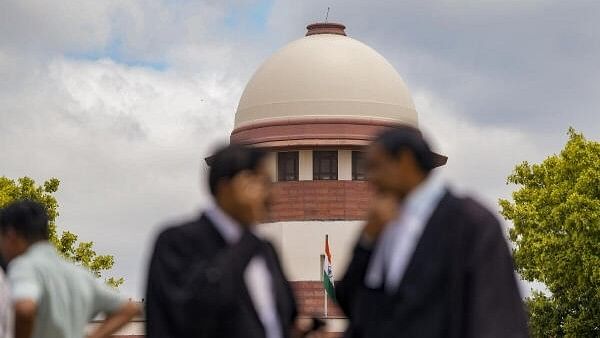
Supreme Court of India.
Credit: PTI Photo
New Delhi: The Supreme Court on Friday held that an accused is entitled to challenge his arrest under Section 19(1) of the Prevention of Money Laundering Act, in view of the fact that such a power exercised by an Enforcement Directorate officer is drastic and could affect his right to liberty.
The court declared a genuine belief and reasoning on the basis of evidence must be recorded on the arrestee’s guilt before making his arrest.
"We are concerned with violation of personal liberty, and the exercise of the power to arrest in accordance with law. Scrutiny of the action to arrest, whether in accordance with law, is amenable to judicial review. It follows that the “reasons to believe” should be furnished to the arrestee to enable him to exercise his right to challenge the validity of arrest," a bench of Justices Sanjiv Khanna and Dipankar Datta said.
"Arrest can and should wait, and the power in terms of Section 19(1) of the PML Act can be exercised only when the material with the designated officer enables them to form an opinion, by recording reasons in writing that the arrestee is guilty," the bench said.
In the matter, the court examined in detail the power of arrest by an authorised officer Section 19(1) of the PML Act and the rights of the accused.
"Given that the power of arrest is drastic and violates Article 21 of the Constitution, we must give meaningful, true and full play to the legislative intent. Providing the written “grounds of arrest”, though a must, does not in itself satisfy the compliance requirement," the bench said.
The court pointed out the authorised officer’s genuine belief and reasoning based on the evidence that establishes the arrestee’s guilt is also a legal necessity.
"As the “reasons to believe” are accorded by the authorised officer, the onus to establish satisfaction of the said condition will be on the ED and not on the arrestee," the court added.
It did not agree to a contention by the ED that grave suspicion is sufficient to frame a charge and put the accused to trial.
"This contention should not be accepted, since we are not dealing with the trial, framing of charge or recording the evidence. The issue before us, which has to be examined and answered, is whether the arrest of the person during the course of investigation complies with the law," the court said.
The bench also said the right to bail under Section 45 of the PML Act is not dependent on the stage of the proceedings. The power of the court under Section 45 is unrestricted with reference to the stage of the proceedings, it pointed out.
The court clarified the exercise of the power and satisfaction of the conditions must and should be put to judicial scrutiny and examination, if the arrestee specifically challenges their arrest.
"If we do not hold so, then the restraint prescribed by the legislature would, in fact and in practice, be reduced to a mere formal exercise. Given the conditions imposed, the nature of the power and the effect on the rights of the individuals, it is nobody’s case, and not even argued by the ED that the authorised officer is entitled to arrest a person without following the statutory requirements," the bench said.
The court also categorically rejected a contention by the ED that discretion and right to arrest vests with the competent officer, whose subjective opinion should prevail.
"We do not agree and must reject this argument. We hold that the power of judicial review shall prevail, and the court/magistrate is required to examine that the exercise of the power to arrest meets the statutory conditions," the bench said.
